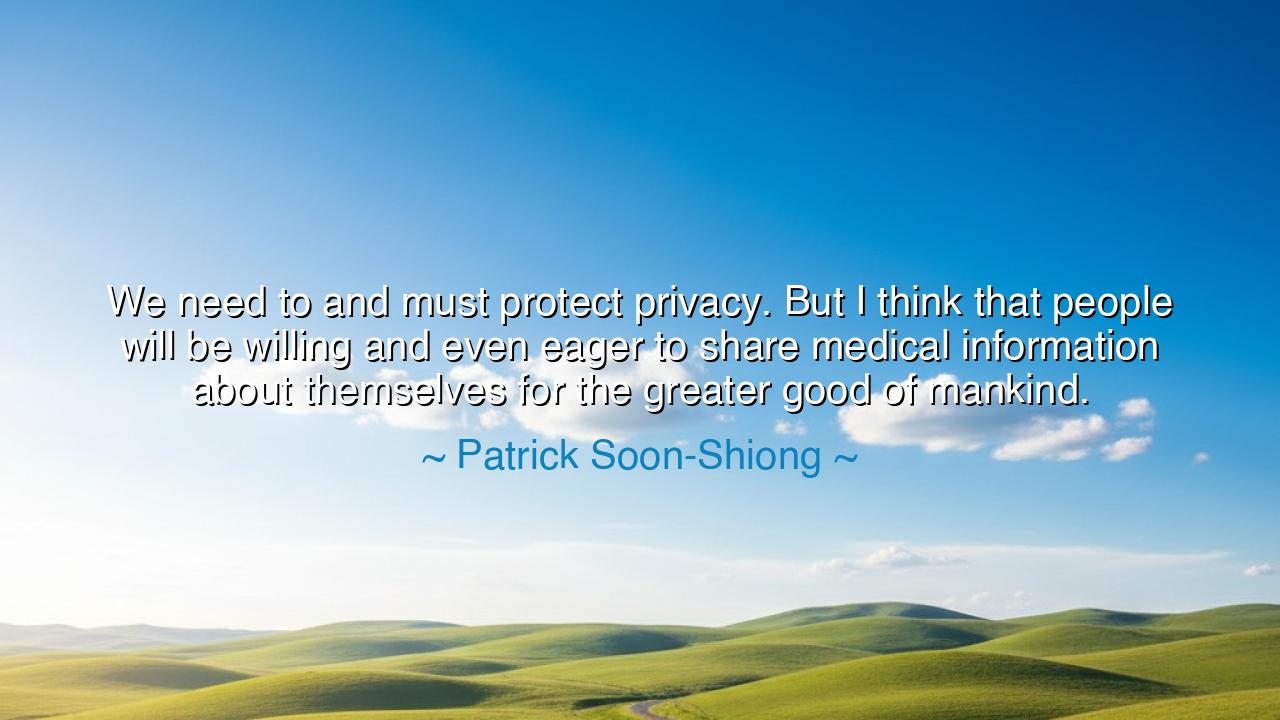
We need to and must protect privacy. But I think that people will
We need to and must protect privacy. But I think that people will be willing and even eager to share medical information about themselves for the greater good of mankind.






When Patrick Soon-Shiong proclaimed, “We need to and must protect privacy. But I think that people will be willing and even eager to share medical information about themselves for the greater good of mankind,” he spoke of a delicate balance, one as ancient as the tension between self and society. His words capture the eternal struggle between guarding the sanctity of the individual and opening the gates of knowledge for the healing of the many. It is a truth that demands both reverence and courage: that our most personal truths, when shared with honor, can become the foundation of humanity’s survival.
The meaning of this statement rests on the recognition that privacy is sacred. To expose the body, its ailments, its frailties, has always been a vulnerable act. The ancients cloaked their healers with oaths, binding them never to betray the secrets entrusted to them. And yet, Soon-Shiong calls us to see beyond fear, to recognize that the sharing of medical information, done wisely and with safeguards, may become the key to unlocking cures for diseases that afflict millions. To protect privacy while still offering knowledge is to walk a narrow road — but it is a road that leads to collective strength.
History shows us how such sacrifices have borne fruit. When smallpox ravaged civilizations, it was only through the gathering of countless cases, observations, and shared experiences that vaccination was born. In the twentieth century, when polio spread its shadow across the earth, parents offered their children’s medical histories to researchers, knowing that only through shared knowledge could Jonas Salk and others forge a vaccine. Their willingness to share private suffering gave rise to public salvation. This is what Soon-Shiong means when he speaks of the greater good of mankind: that individual trust can blossom into collective healing.
Yet his words also carry caution. For to neglect privacy is to wound the dignity of the individual, to turn what should be sacred into exploitation. We remember times when power misused the secrets of the body — when data was taken without consent, when marginalized communities were treated as experiments rather than equals. The lesson is clear: privacy must be protected with vigilance, even as sharing is encouraged for the sake of healing. Trust, once broken, cannot easily be restored. Thus, any path forward must be built upon honor, transparency, and justice.
What makes Soon-Shiong’s vision heroic is the belief that people will not only agree to share but will be eager to do so, if they see the fruits of their sacrifice. When one understands that their data, their story, their illness, may become the seed of another’s cure, the act of sharing is no longer loss but gift. It is to transform suffering into salvation, weakness into strength. Here, personal pain is alchemized into communal hope.
The lesson for us, then, is profound: guard your privacy, but do not cling to it so tightly that it prevents you from being part of the healing of humanity. Consider what you can give, not only for yourself but for those who come after. In the ancient spirit of offering, your story may become the key to sparing another family grief. And in turn, demand that those who receive such sacred trust honor it with integrity and wisdom.
Practical actions rise from this teaching. Support institutions that balance innovation with the safeguarding of privacy. Learn about how your medical information is used, and give consent consciously, as a steward of knowledge. Advocate for laws that protect individuals while enabling collective research. And above all, cultivate within yourself the vision Soon-Shiong inspires: to see your life not as an island, but as part of the great tapestry of mankind, where each thread strengthens the whole.
Thus, let his words endure: to protect privacy is duty, but to share with courage, for the greater good of mankind, is destiny. May future generations remember that the health of one is tied to the health of all, and that in offering what is most personal, we create what is most universal — the healing of the human race.






AAdministratorAdministrator
Welcome, honored guests. Please leave a comment, we will respond soon